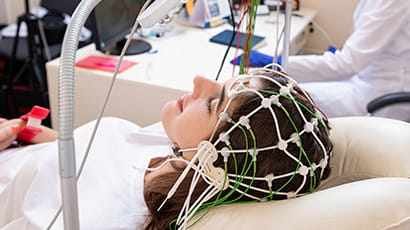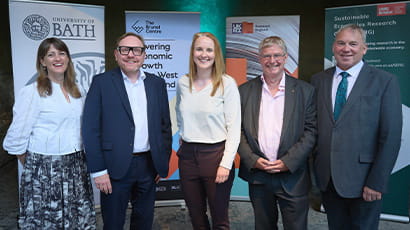UWE Bristol scientists generate record amount of electricity from urine at Glastonbury Festival 2019

Researchers behind technology that converts urine into electricity generated a record amount of power at this year's Glastonbury Festival.
A team of academics from the University of the West of England (UWE Bristol) have been taking their PEE POWER® system to the festival since 2015, installing a urinal block to trial the technology and raise awareness of sustainable sanitation.
Now the researchers have analysed the performance of the urinal and discovered three times more power was generated in 2019 compared with the system installed at the Glastonbury 2017 event.
The urinal, located near the Pyramid Stage, powered lighting inside the toilet block and provided electricity for handheld gaming devices made available for festival-goers to play on as well as for electro-valves for automating the feedstock flow into the system's microbial fuel cell (MFC) modules.
Data captured by academics showed 400 litres of urine were processed on each day of the festival, generating 288Wh (Watt-hours). Over four days, this is equivalent to the power needed to light a 30-room hotel or office block for an hour, or to charge 57 USB-powered electronic devices for an hour.
The PEE POWER® system is being commercialised, as announced last year, and introduced to schools in remote or off-grid areas in the developing world. The technology could eventually be installed in refugee camps, slums and hospitals.
More than 5,000 people used the urinal block at Glastonbury this year. Of the 4,750 submitting feedback, 92 per cent said the system had given them more confidence about sustainable sanitation through technology deployment. Seventy-seven people completed a full survey, with the vast majority agreeing the technology had changed their awareness of the situation of the billion people without access to electricity or adequate sanitation.
Professor Ioannis Ieropoulos, Director of the Bristol BioEnergy Centre at Bristol Robotics Laboratory, said: “It was the biggest success we've had at Glastonbury. We even generated a surplus of energy, meaning the lights in the block remained lit for the week following the end of the festival. The interaction with the public was fantastic - some said the technology was 'amazing' and 'ingenious' and were even asking when it would be arriving in people's homes.”
Dr Xavier Walter, who worked on system during the festival, said: “We retained the same footprint of the urinal block this year but the technology is getting smaller as we refine it, so we were able to include three times as many microbial fuel cells. We're aiming to generate even more electricity at the 2020 event.”
The team's presence at Glastonbury is the result of a close collaboration with partners Oxfam, log cabin and garden building specialists Dunster House and WhiffAway in a collective effort to improve lives in refugee camps and areas of the world with no sanitation or electricity.
The PEE POWER® demonstration is the flagship research project of a formal partnership between Glastonbury Festival and UWE Bristol signed in 2017 focusing on sustainability projects including waste reduction and energy efficiency.
Related news

12 December 2025
UWE Bristol’s environmentally conscious and student-focused accommodation wins three awards
Purdown View, the world's largest certified Passivhaus student accommodation development, has been recognised at Property Week Student Accommodation Awards.

25 November 2025
Health-tech start up MyCelsius launches breakthrough cooling tech for hot flushes developed at UWE Bristol’s Launch Space
A pioneering Bristol-based health-tech company developing cutting-edge cooling technology for hot flushes has credited UWE Bristol’s Launch Space incubator with playing a key role in accelerating its product development.

14 November 2025
Lecturer wins prestigious Times Higher Education award for innovation in teaching
A senior paramedic science lecturer at UWE Bristol has been named the most innovative teacher of the year in the Times Higher Education Awards 2025.

13 November 2025
Alliance Medical and UWE Bristol launch UK’s first PET-CT postgraduate certificate
In a move set to transform imaging education, Alliance Medical (AML) and UWE Bristol have joined forces to co-design and develop the UK’s first PET-CT Postgraduate Certificate (PG Cert).

13 November 2025
New AI research to revolutionise animal welfare
A UWE Bristol research project will combine behavioural science and AI to create technology that understands not only what animals do, but how they feel.

29 October 2025
UWE Bristol academic unveils breakthrough in energy-efficient AI at NATO science forum
Dr Jonathan Lancelot has developed a new form of AI that could transform how intelligent machines operate in space, defence, and remote environments.

07 October 2025
Academic playing role in project to find hidden graves in Mexico using drone technology
A UWE Bristol lecturer is playing a part in a project using drone technology to locate concealed graves in Mexico.

01 October 2025
New funding for researchers to develop trustworthy clinical AI for assessing brain activity
Researchers have received funding from UK Research and Innovation to help bring their innovative brain-monitoring AI technology closer to real-world use.

11 September 2025
New study to investigate augmented reality as an intervention for emotionally based school avoidance
A UWE Bristol researcher will support a new study exploring whether an augmented reality board game can help young people with emotionally based school avoidance (EBSA).

22 August 2025
A decade of Future Space: How UWE Bristol’s enterprise zone is powering innovation and economic growth
Tracey John, Director of Research and External Engagement, reflects on the impact of Future Space and its role as a launchpad for cutting-edge companies shaping the future of how we live and work.

11 July 2025
Wound dressings developed with support from UWE Bristol to be launched by global firm
Technology that a team of UWE Bristol scientists helped develop to aid the healing of chronic wounds will be used in new ‘smart dressings’ being launched by global medical company.

03 July 2025
Research lab The Brunel Centre opens to power sustainable and inclusive growth for the West of England
A new data and research centre designed to support sustainable and inclusive growth and industrial strategy in the region, has officially launched.






